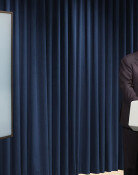More Economic Concerns Remain
The global economy has recently shown signs of recovery from the U.S. subprime mortgage crisis. However, Korea faces a possible recession in its real economy.
Financial sector-driven difficulties in the United States, which have spread to the real economy including consumption and employment, have accelerated an economic slowdown. Experts predict that Asian economies including the Korean economy, which have heavily depended on exports, will see their real economies be put under pressure.
Economists are worried that Koreas economic growth rate, which is estimated to stay between 5.6 percent and 5.9 percent in the first quarter, is highly likely to fall below the 3 percent level. Some even predict that the worlds economic growth rate will tumble more sharply than expected.
○ Lowering Prospects for Economic Growth
The International Monetary Fund predicted on Thursday that the global economy would grow by 3.7 percent, 0.4 percent point lower than its January estimation of 4.1 percent. The predicted growth rate of 3.7 percent is the lowest since 2002 when the global economy grew a mere 3.1 percent.
The IMF said that the U.S. housing market slowdown and ensuing credit contraction have put a heavy burden on the global economy. IMFs chief economist Simon Johnson predicted that the U.S. economic growth has slowed and finally stalled, effectively. He added that due to ever-deepening worries in the U.S. housing and credit markets, the global economy would stay weak for several consecutive quarters.
U.S. Federal Reserve Board Chairman Ben Bernanke suggested the possibility of economic recession for the first time in public. Addressing the Congress, the chairman said on Wednesday, The United States GDP is unlikely to grow dramatically in the first half. Instead, it might drop.
Shin Yong-sang, a researcher of the Korea Institute of Finance, said, The analysis that the subprime mortgage crisis has calmed down is only limited to the financial sector. Since the difficulties in the financial sector have spread to the real economy, Americans will experience a housing market slowdown, a decrease in consumption and corporate investment, and dull employment for a considerable amount of time.
○ Korea Affected by Decreasing Imports by U.S.
The U.S. economic slowdown inevitably affects Korea. International credit-rating agencies have lowered their prospects for Koreas economic growth this year.
According to the Korea Center for International Finance, the average of forecasts for Koreas economic growth in 2008 released by 16 major investment banks including JPMorgan and Goldman Sachs is 4.5 percent, 0.4 percentage point lower than 4.9 percent of economic growth forecast released in late last year. Notably, Citigroup predicted that Koreas economy would grow 3.9 percent and the European investment bank UBS forecasted that the nations economy would expand 3.6 percent this year.
Kim Jae-hong, a senior researcher of the International Trade Research Center under the Korea International Trade Association, said, Some 60-70 percent of the U.S, economy depends on consumption, most of which is provided by imports. A U.S. consumption slowdown results in a decrease in imports, which, in turn, negatively affects Koreas exports. Moreover, Koreas part exports to emerging nations including China whose economies have heavily depended on exports to the United States will also decrease.
According to the Bank of Korea, if the worlds trade volume decreases 1 percent, Koreas annual economic growth rate falls 0.57 percentage point and its current account balance worsens by $1.1 billion.
Korea faces price uncertainties due to rising raw material prices including oil prices. Moreover, Koreas current account balance has stayed in the red for three consecutive months so far. Worse, Koreans face employment instability since monthly job creation (year-on-year increment in the number of newly employed people) has dropped from 280,000 in November 2007 to 210,000 in February 2008.
○ Real Economy Policy in Dilemma
The government has struggled to come up with an economic stimulus package.
Most troubled issues are interest rate and foreign exchange rate policies. If the government either lowers interest rates or lets the won-dollar exchange rate rise further, it might bring about unpleasant results in which consumer prices increase more than 4 percent.
If the government funds social-overhead-capital construction projects, it can boost employment and partly help the economy recover. However, given the ever-expanding economic scale, the governments capital injection will not make a grave change. If any, it will take a long time for the public fund to positively affect the real economy.
As a result, the government is considering policies that encourage investment confidence in the private sector via deregulation. However, some experts argue that the government cannot ease regulations enough to draw corporate investment. They also explain that even deregulation will not boost corporate investment due to the worlds economic slowdown.
Making matters worse, bad performances of foreign funds as well as domestic funds have deprived consumers of confidence.
Hyundai Research Institute Director Yu Byung-gyu said, Since the government is in a fix where it should consider a variety of aspects of the economy, it needs to fine-tune policies so as to strike a balance between economic growth and stability.
ssoo@donga.com legman@donga.com
Headline News
- Pyongyang’s trash provocation makes Seoul consider loudspeaker broadcasting
- Two Korean Americans win prizes at Queen Elisabeth Competition
- Tech firms including Google, Intel form anti-Nvidia frontline
- Biden suggests cease-fire plan to end war
- Kim Woo-min wins gold in men’s 400m freestyle in personal best time







